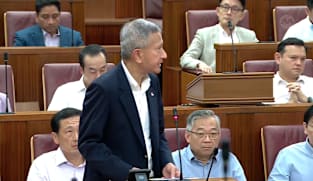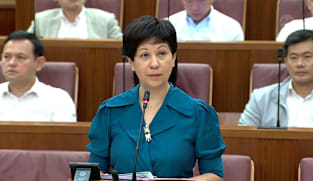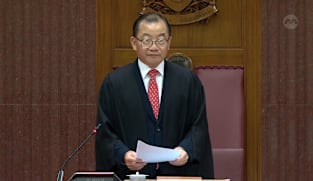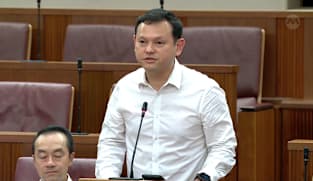Adjournment motion on global leadership in artificial intelligence
Singapore should proactively build comprehensive local data sets for homegrown artificial intelligence (AI) development, said MP Gerald Giam. In his adjournment motion in Parliament on Monday (Feb 5), he stressed the need to pursue a few ambitious publicly funded "moonshot" projects. These projects must prioritise transparency and align their outcomes with the national interests and ensure that the economic gains directly benefit citizens. Mr Giam also cautioned that Singapore may become only a consumer of such platforms. He proposed a new Government-owned AI start-up to catalyse this moonshot, or “catalyst corporation”. It should be independently run with commercial dynamism, yet be ultimately answerable to Singaporeans. He listed five principles that a well-chosen moonshot should have. Its products or services must directly benefit Singapore and Singaporeans. It should have export potential and become part of Singapore's economic growth engine. It needs to have durable advantages to avoid being quickly out-competed or swallowed up by global tech giants. There must be a genuine and unmet global market gap that Singapore has advantages in tackling. Industry should be right for fundamental disruption, not just incremental improvements, said Mr Giam. He said healthcare AI could be a moonshot that Singapore can aim for. It has the ingredients for a breakthrough and could combine the existing ingredients into a coherent strategy. "We should aim to export specialised services and medical diagnoses, not raw data. We can create an advanced AI model trained on genetics, protein biomarkers, histology and electronic health records. We should aim to radically improve our ability to prevent disease, intervene and make causal inferences,” he said. Mr Giam said Singapore has the talent, resources and infrastructure needed to compete for the top spot in selected AI fields. “Achieving it requires political will, a readiness to embrace risks and proactive intervention by the Government. We can do it and we must do it for the benefit of Singapore and Singaporeans,” he said. Responding, Senior Minister of State for Communications and Information Janil Puthucheary agreed that ambitious and innovative projects should be attempted to create opportunities that are transformative. For frontier digital technologies like AI, Singapore’s approach should target excellence in key domains and create an environment with solid foundations that maximise the chances of success, he said. Singapore will advance its interests by growing its AI ecosystem, partnering internationally and creating good jobs that benefit its companies and citizens. Dr Janil said the Government will be sharing more details on the implementation of its strategy to harness AI for the public good, the country and the world. Dr Janil said domestic data and local models are not enough for Singapore to achieve its ambitions. He said it is important to “resist the allure of data localisation narratives” and stressed the need to remain connected, allow for and advocate cross-border data flows as long as adequate protection is ensured. “We must maintain our ability to access and use global data and models to deliver good outcomes for Singapore and Singaporeans,” he said. For Singapore to succeed, it must remain open to innovation, talent, data and ideas from around the world, he added. It will also need to work with partners from around the world to address the wide-ranging impact that AI can potentially have. “Taking a protectionist stance will do us more harm than good and it will undermine our hard-won credibility as a serious, constructive, inclusive society and nation,” he said.
Singapore should proactively build comprehensive local data sets for homegrown artificial intelligence (AI) development, said MP Gerald Giam. In his adjournment motion in Parliament on Monday (Feb 5), he stressed the need to pursue a few ambitious publicly funded "moonshot" projects. These projects must prioritise transparency and align their outcomes with the national interests and ensure that the economic gains directly benefit citizens. Mr Giam also cautioned that Singapore may become only a consumer of such platforms. He proposed a new Government-owned AI start-up to catalyse this moonshot, or “catalyst corporation”. It should be independently run with commercial dynamism, yet be ultimately answerable to Singaporeans. He listed five principles that a well-chosen moonshot should have. Its products or services must directly benefit Singapore and Singaporeans. It should have export potential and become part of Singapore's economic growth engine. It needs to have durable advantages to avoid being quickly out-competed or swallowed up by global tech giants. There must be a genuine and unmet global market gap that Singapore has advantages in tackling. Industry should be right for fundamental disruption, not just incremental improvements, said Mr Giam. He said healthcare AI could be a moonshot that Singapore can aim for. It has the ingredients for a breakthrough and could combine the existing ingredients into a coherent strategy. "We should aim to export specialised services and medical diagnoses, not raw data. We can create an advanced AI model trained on genetics, protein biomarkers, histology and electronic health records. We should aim to radically improve our ability to prevent disease, intervene and make causal inferences,” he said. Mr Giam said Singapore has the talent, resources and infrastructure needed to compete for the top spot in selected AI fields. “Achieving it requires political will, a readiness to embrace risks and proactive intervention by the Government. We can do it and we must do it for the benefit of Singapore and Singaporeans,” he said. Responding, Senior Minister of State for Communications and Information Janil Puthucheary agreed that ambitious and innovative projects should be attempted to create opportunities that are transformative. For frontier digital technologies like AI, Singapore’s approach should target excellence in key domains and create an environment with solid foundations that maximise the chances of success, he said. Singapore will advance its interests by growing its AI ecosystem, partnering internationally and creating good jobs that benefit its companies and citizens. Dr Janil said the Government will be sharing more details on the implementation of its strategy to harness AI for the public good, the country and the world. Dr Janil said domestic data and local models are not enough for Singapore to achieve its ambitions. He said it is important to “resist the allure of data localisation narratives” and stressed the need to remain connected, allow for and advocate cross-border data flows as long as adequate protection is ensured. “We must maintain our ability to access and use global data and models to deliver good outcomes for Singapore and Singaporeans,” he said. For Singapore to succeed, it must remain open to innovation, talent, data and ideas from around the world, he added. It will also need to work with partners from around the world to address the wide-ranging impact that AI can potentially have. “Taking a protectionist stance will do us more harm than good and it will undermine our hard-won credibility as a serious, constructive, inclusive society and nation,” he said.



















